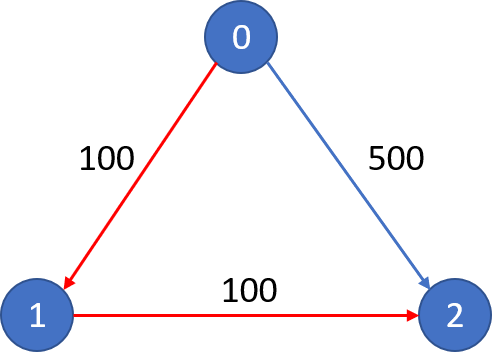787. Cheapest Flights Within K Stops
There are n cities connected by m flights. Each flight starts from city u and arrives at v with a price w.
Now given all the cities and flights, together with starting city src and the destination dst, your task is to find the cheapest price from src to dst with up to k stops. If there is no such route, output -1.
Example 1: Input: n = 3, edges = [[0,1,100],[1,2,100],[0,2,500]] src = 0, dst = 2, k = 1 Output: 200 Explanation: The graph looks like this:

The cheapest price from city0to city2with at most 1 stop costs 200, as marked red in the picture.
Example 2: Input: n = 3, edges = [[0,1,100],[1,2,100],[0,2,500]] src = 0, dst = 2, k = 0 Output: 500 Explanation: The graph looks like this:

The cheapest price from city0to city2with at most 0 stop costs 500, as marked blue in the picture.
1 class Solution { 2 public int findCheapestPrice(int n, int[][] flights, int src, int dst, int k) { 3 Map<Integer, Map<Integer, Integer>> prices = new HashMap<>(); 4 for (int[] f : flights) { 5 if (!prices.containsKey(f[0])) prices.put(f[0], new HashMap<>()); 6 prices.get(f[0]).put(f[1], f[2]); 7 } 8 Queue<int[]> pq = new PriorityQueue<>((a, b) -> (Integer.compare(a[0], b[0]))); 9 pq.add(new int[] {0, src, k + 1}); 10 while (!pq.isEmpty()) { 11 int[] top = pq.remove(); 12 int price = top[0]; 13 int city = top[1]; 14 int stops = top[2]; 15 if (city == dst) return price; 16 if (stops > 0) { 17 Map<Integer, Integer> adj = prices.getOrDefault(city, new HashMap<>()); 18 for (int a : adj.keySet()) { 19 pq.add(new int[] {price + adj.get(a), a, stops - 1}); 20 } 21 } 22 } 23 return -1; 24 } 25 }



 浙公网安备 33010602011771号
浙公网安备 33010602011771号